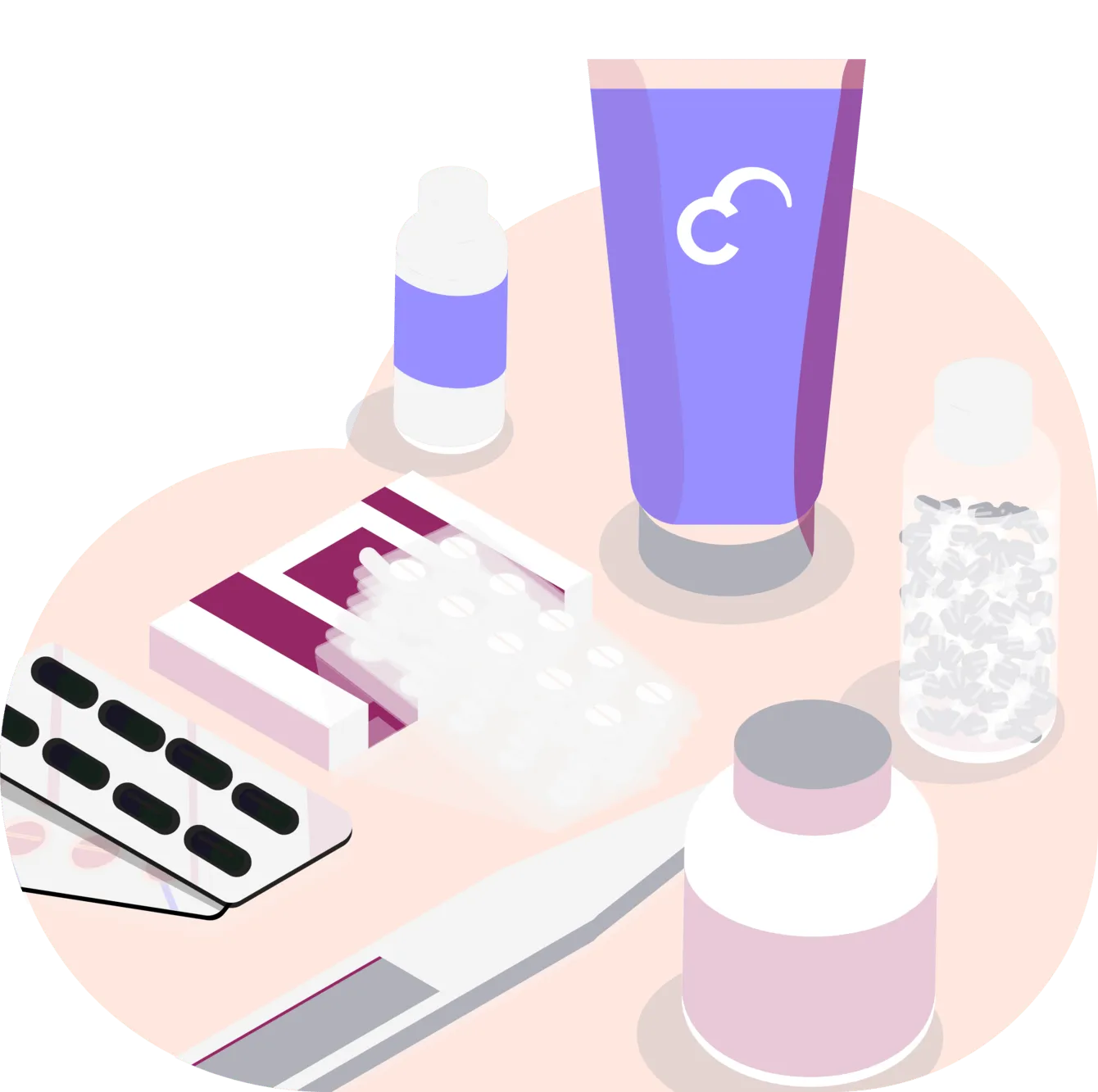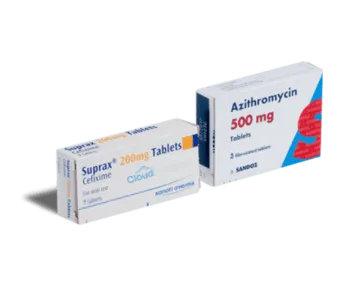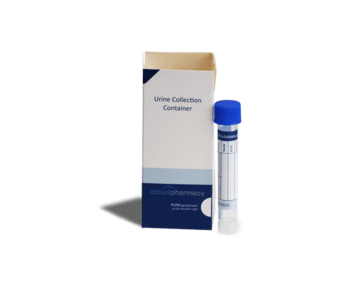Gonorrhea

More information
Introduction
Gonorrhoea is a bacterial infection which is transmitted through sex. Common symptoms might include penile or vaginal discharge, but sometimes no noticeable signs may be present.
- Over 82,000 UK cases reported in 2022
- 50% of female cases display no symptoms
- Treatable with prescription antibiotics
If you have tested positive for gonorrhoea, and are unable to have the first-line injection, you may be able to order gonorrhoea treatment online. Take our questionnaire to have your request reviewed by our medical team.
Treatments
More information
Once an online consultation has been been approved by our medical team, our pharmacy will safely prepare and ship your treatment to you in discreet packaging using Royal Mail or DPD.
What is Gonnorhoea?
Gonorrhea is a Sexually Transmitted Infection (STI) which is caused by the bacteria Neisseria gonorrhoeae or gonococcus. Gonorrhea was formerly referred to as "the clap" as a slang term to refer to the condition. The bacteria can be found mainly in discharge from the penis and inside vaginal fluid. Gonorrhea can be easily passed between people through vaginal, oral or anal sex and through sharing sex toys, such as vibrators that have not been washed or covered with a new condom each time they are used. The bacteria can infect the entrance of the womb (cervix), the tube that passes urine out of the body (urethra), the rectum and less commonly the throat or eyes. The infection can be passed from pregnant women to the baby. If you are pregnant and think you may have gonorrhea, it is important that you get tested and treated before your baby is born.
How do I treat Gonnorhoea?
Antibiotics are a second line treatment for Gonorrhea; the first line treatment is usually an injection and the tablets are taken by people who would prefer taking tablets over an injection. The antibiotics used to treat gonorrhea are Azithromycin and Suprax (Cefixime). The antibiotic treatment consists of all tablets taken as a SINGLE DOSE. In order to adequately treat Gonorrhea, our doctors will prescribe 400mg Suprax tablets and 2000mg Azithromycin tablets. The correct antibiotic treatment described previous for the treatment of Gonorrhea has been shown to be 95% effective in completely clearing the infection.
Causes
Gonorrhea is transmitted through sexual contact with the penis, vagina, mouth, or anus of an infected partner. Ejaculation does not have to occur for gonorrhea to be transmitted or acquired. Gonorrhea can also be spread perinatally from mother to baby during childbirth.
People who have had gonorrhea and received treatment may be reinfected if they have sexual contact with a person infected with gonorrhea.
Symptoms
Gonorrhoea doesn’t always cause symptoms. But even where it is asymptomatic, the condition can still lead to serious complications.
What symptoms can gonorrhoea cause in women?
Women with gonorrhoea may notice:
- pain or burning in the vagina when going to the toilet
- watery yellow or green discharge from the vagina
- pain or feelings of tenderness in the lower abdomen
- bleeding or spotting between periods
or heavier bleeding than normal during a period
What symptoms can gonorrhoea cause in men?
Men with gonorrhoea may notice:
- pain or burning in the penis when going to the toilet
- white, yellow or green discharge from the end of the penis
- pain or feelings of tenderness in the testicles
or balanitis (pain or inflammation of the foreskin)
Which other parts of the body can gonorrhoea affect?
As well as as the genitals, a gonorrhoea infection can also affect:
- the throat. It usually doesn’t cause any symptoms in such cases.
- the rectum. This can cause symptoms of pain or discharge.
- the eyes. Conjunctivitis, where the eyes become red, inflamed and bloodshot, and start to leak pus, can occur as a result of a gonorrhoea infection in the eyes.
The above usually develop when infected sperm or vaginal fluid comes into contact with tissue in those areas (for example, if sperm comes into contact with tissue inside the anus during anal sex, or with the mouth and throat during oral sex). The infection can also be passed on through the shared use of sex toys; which can entail contact with the anus or throat.
How quickly will gonorrhoea symptoms develop?
If symptoms do develop, they’ll tend to appear within one to two weeks following infection. But this isn’t always the case, and symptoms can take much longer to manifest.
Gonorrhoea has the capacity to be symptomless, so it’s fairly common for people to carry the infection but not know. Some people may have no symptoms at all before complications start to develop later on, after the infection has been present for some time.
Because it is so unpredictable, the only way to know if you have gonorrhoea is to get tested.
Will gonorrhoea symptoms go away on their own?
It’s possible for gonorrhoea symptoms to go away without treatment, but this doesn’t mean that the infection has gone or isn’t still causing damage in the body; complications may well occur despite the absence of symptoms.
Theoretically it is possible for the body to overcome the infection by itself and rid it from the body without treatment, but the likelihood of this happening is very low. Treatment is required in order to tackle the infection; and because gonorrhoea has demonstrated resistant qualities to many antibiotics, re-testing following treatment is usually necessary to ensure the infection is gone.
How often is gonorrhoea symptomless?
Around 10 percent of male cases are thought to be symptomless; whereas 50 percent of female cases are thought to be symptomless.
So if you suspect you may have come into contact with gonorrhoea, you will need to have a urine or swab test before you can know for sure. The presence or absence of symptoms is not enough to determine whether or not you have it.
If you have had sex with someone who has suspected gonorrhoea, it’s important to get tested right away.
What treatments are available?
How is Gonorrhoea treated?
Gonorrhoea is treated by medical professionals via a short course of antibiotic medication. This is typically very proficient at tackling the infection, and often clears all signs of it in a matter of days.
The best treatment (sometimes called first-line treatment) in the UK for gonorrhoea comprises of two antibiotics. One is given as an injection, and the other as a tablet. This injection will need to be given by a trained health professional however, which means that you can’t buy it and inject the treatment yourself.
Another form of treatment consists of Azithromycin and Suprax, two oral antibiotics; although this method is not as effective at treating Gonorrhoea, so this is only recommended for use in cases where the injection is unsuitable or a patient is needle-phobic.
It is important to finish the course of medication prescribed for you, and to get tested again once you have completed treatment, to ensure that the infection has passed. Obviously, you should refrain from engaging in sex during this time.
How does treatment for Gonorrhoea work?
Antibiotics come in many different forms. They are generally indicated for the treatment of infections caused by bacteria. They work by breaking down the cells of infection-causing bacteria, and restoring balance in the body.
Until recently, doctors would tend to cure gonorrhoea with just one form of antibiotic drug. However, due to the emergence of resistant strains of the infection, many now prescribe a combination treatment involving two antibiotic agents to ensure that infection is sufficiently treated.
FAQ
What causes Gonorrhea?
Gonorrhea is transmitted through sexual contact with the penis, vagina, mouth, or anus of an infected partner. Ejaculation does not have to occur for gonorrhea to be transmitted or acquired. Gonorrhea can also be spread perinatally from mother to baby during childbirth.
People who have had gonorrhea and received treatment may be reinfected if they have sexual contact with a person infected with gonorrhea.
What treatments are available?
How is Gonorrhoea treated?
Gonorrhoea is treated by medical professionals via a short course of antibiotic medication. This is typically very proficient at tackling the infection, and often clears all signs of it in a matter of days.
The best treatment (sometimes called first-line treatment) in the UK for gonorrhoea comprises of two antibiotics. One is given as an injection, and the other as a tablet. This injection will need to be given by a trained health professional however, which means that you can’t buy it and inject the treatment yourself.
Another form of treatment consists of Azithromycin and Suprax, two oral antibiotics; although this method is not as effective at treating Gonorrhoea, so this is only recommended for use in cases where the injection is unsuitable or a patient is needle-phobic.
It is important to finish the course of medication prescribed for you, and to get tested again once you have completed treatment, to ensure that the infection has passed. Obviously, you should refrain from engaging in sex during this time.
How does treatment for Gonorrhoea work?
Antibiotics come in many different forms. They are generally indicated for the treatment of infections caused by bacteria. They work by breaking down the cells of infection-causing bacteria, and restoring balance in the body.
Until recently, doctors would tend to cure gonorrhoea with just one form of antibiotic drug. However, due to the emergence of resistant strains of the infection, many now prescribe a combination treatment involving two antibiotic agents to ensure that infection is sufficiently treated.
What are the symptoms?
Gonorrhoea doesn’t always cause symptoms. But even where it is asymptomatic, the condition can still lead to serious complications.
What symptoms can gonorrhoea cause in women?
Women with gonorrhoea may notice:
- pain or burning in the vagina when going to the toilet
- watery yellow or green discharge from the vagina
- pain or feelings of tenderness in the lower abdomen
- bleeding or spotting between periods
or heavier bleeding than normal during a period
What symptoms can gonorrhoea cause in men?
Men with gonorrhoea may notice:
- pain or burning in the penis when going to the toilet
- white, yellow or green discharge from the end of the penis
- pain or feelings of tenderness in the testicles
or balanitis (pain or inflammation of the foreskin)
Which other parts of the body can gonorrhoea affect?
As well as as the genitals, a gonorrhoea infection can also affect:
- the throat. It usually doesn’t cause any symptoms in such cases.
- the rectum. This can cause symptoms of pain or discharge.
- the eyes. Conjunctivitis, where the eyes become red, inflamed and bloodshot, and start to leak pus, can occur as a result of a gonorrhoea infection in the eyes.
The above usually develop when infected sperm or vaginal fluid comes into contact with tissue in those areas (for example, if sperm comes into contact with tissue inside the anus during anal sex, or with the mouth and throat during oral sex). The infection can also be passed on through the shared use of sex toys; which can entail contact with the anus or throat.
How quickly will gonorrhoea symptoms develop?
If symptoms do develop, they’ll tend to appear within one to two weeks following infection. But this isn’t always the case, and symptoms can take much longer to manifest.
Gonorrhoea has the capacity to be symptomless, so it’s fairly common for people to carry the infection but not know. Some people may have no symptoms at all before complications start to develop later on, after the infection has been present for some time.
Because it is so unpredictable, the only way to know if you have gonorrhoea is to get tested.
Will gonorrhoea symptoms go away on their own?
It’s possible for gonorrhoea symptoms to go away without treatment, but this doesn’t mean that the infection has gone or isn’t still causing damage in the body; complications may well occur despite the absence of symptoms.
Theoretically it is possible for the body to overcome the infection by itself and rid it from the body without treatment, but the likelihood of this happening is very low. Treatment is required in order to tackle the infection; and because gonorrhoea has demonstrated resistant qualities to many antibiotics, re-testing following treatment is usually necessary to ensure the infection is gone.
How often is gonorrhoea symptomless?
Around 10 percent of male cases are thought to be symptomless; whereas 50 percent of female cases are thought to be symptomless.
So if you suspect you may have come into contact with gonorrhoea, you will need to have a urine or swab test before you can know for sure. The presence or absence of symptoms is not enough to determine whether or not you have it.
If you have had sex with someone who has suspected gonorrhoea, it’s important to get tested right away.
Guides
How it works

First...
Complete a quick eligibility check

Then...
Order your treatment

Finally.
Fast, confidential delivery to your door


















